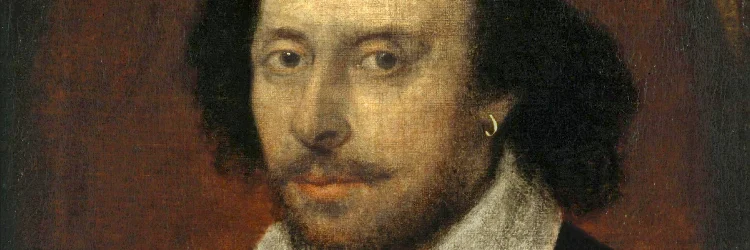
Everything you need to know about the life of William Shakespeare
Whether you're a theatre aficionado or you're new to the scene, the chances are you've seen plenty of William Shakespeare's plays across London and the West End. Whether it's theatrical titans playing King Lear, or a pair of up-and-comers playing the Bard's star-crossed lovers Romeo and Juliet, we all have a favourite Shakespearean production. But how much do you know about the man behind the manuscripts?
Get up to speed on everything you need to know about Shakespeare's life, including Shakespeare's family and wife Anne Hathaway, his hometown of Stratford-upon-Avon, the Globe theatre and the Bard's death with these handy quick-fire facts.
Shakespeare's birth
- William Shakespeare was born in the English market town of Stratford-upon-Avon in April 1564.
- While we know he was born in April, historians are not 100% certain of the exact date. He was baptised on 26th April, and baptisms usually took place within 3 days of a new arrival, so 23rd April is the date Shakespeare's birthday is celebrated on.
- His father, John, was a glove-maker and town councillor, and his mother Mary was the daughter of a farmer from a nearby town.
- He was born at a house on Henley Street in Stratford-upon-Avon, which is where he spent many of his childhood years. It is now a museum open to the public.
- Shakespeare was the third of eight siblings, although when he was born, his two older sisters had died: Joan and Margaret. His younger siblings were Gilbert, Joan, Anne, Richard and Edmund.
Shakespeare's childhood
- Shakespeare's schooling would have started at home, with his mother Mary telling him fairy tales, fables, and passages from the bible.
- His first formal schooling would have been at Petty School, where he would have learnt the alphabet and numbers.
- King's New School, a local grammar school for boys in the town, was a stone's throw away from Shakespeare's childhood home. Here, there was a focus on learning Latin; they were taught of Latin authors and were required to speak Latin to each other in the playground.
- Shakespeare would have probably left school around the age of fourteen, which was normal for the time.
- There's no record of William Shakespeare attending university, though some of his fellow playwrights did, such as Christopher Marlowe who attended Cambridge.
- When she married Shakespeare, she was already three months pregnant with their first child, Susanna. This, and the fact Anne was 8 years older than Shakespeare, who was 18 at the time, has led some to believe it was a 'shotgun wedding'.
- It's believed that one of Shakespeare's sonnets - 145 - could have made reference to his wife: 'hate away' would sound like the word 'Hathaway' with Elizabethan pronunciation, as 'And saved my life' would have sounded like 'Anne saved my life.'
- When Shakespeare died, the only mention of his wife in his will was to leave her his "second best bed". While some believe this might have been a swipe at Hathaway, possibly for being the 'second-best person' in his intimate life, other theories put forward that the 'best bed' would have been saved for guests, and so the second-best bed would have in fact been their marital bed.
- Hathaway died in August 1623. She wished to be buried with William, but was given a separate grave next to her husband at the Church of the Holy Trinity in Stratford-upon-Avon.
Shakespeare's children
- When he was 18, Shakespeare married Anne Hathaway in November 1582, and they remained married until his death.
- At the time they got married, Anne, who was 26, was pregnant with their first child. To avoid any scandal around the marriage, William sped up the process and made it possible for the pair to marry outside their parish of residence.
- Susanna, their first child, was born six months after their marriage and she was baptised on 26th May 1583. Two years later, their twins Judith and Hamnet were born, baptised on 2nd February 1585.
- Hamnet died at the age of 11 in 1596, though the cause of his death is not known.
- Susanna married John Hall and had one child called Elizabeth, while Judith had three sons with her husband Thomas Quiney: Shakespeare, Richard and Thomas. None of William Shakespeare's grandchildren had their own children, so there are no direct descendants of the Bard.
Shakespeare's early career
- Shakespeare began his life as a player, rather than a playwright. There is a gap in our knowledge of his life between the birth of his twins in 1585, and the year 1592, when he was an established player/playwright in London.
- The first printed work of Shakespeare were two long poems: Venus and Adonis (1593) and The Rape of Lucrece (1594). These were dedicated to Henry Wriothesley, the 3rd Earl of Southampton.
- It was also during this time that Shakespeare wrote his first play: the three parts of Henry VI, The Two Gentlemen of Verona and Titus Andronicus, although it is not agreed which of these came first.
- Following a plague epidemic, Shakespeare and a number of other actors from other companies came together to form a new company: Lord Chamberlain's Men. As the regular dramatist, Shakespeare wrote an average of 2 plays a year for the company, and became a stakeholder in its income.
- His success made him a wealthy man, and he was able to purchase vast amounts of land and property, which made him the envy of his contemporaries.
Shakespeare's sonnets
- Shakespeare wrote a total of 154 sonnets that were published in a quarto on a variety of subjects and topics. They all followed the same rhyming scheme: ABAB CDCD EFEF GG.
- There are six sonnets that appear in some of Shakespeare's plays, such as the prologue of Romeo and Juliet. They can also be found in Henry V and Love's Labour's Lost.
- The publication includes a dedication to a 'Mr W. H.', named as 'the only begetter' of the sonnets, though it's unclear to whom they refer. It is likely to be William Herbert, the Earl of Pembroke, but could also be Henry Wriothesley, the Earl of Southampton.
Shakespeare's life in London
- Shakespeare split his adult life almost equally in two locations, producing work in London, and spending time with his family in Stratford. As such, he had property in both areas, though Shakespeare's 'London years' are thought to be between 1585 and 1612.
- Many of his plays suggest Shakespeare was very involved in social London life, such as Henry IV Part I, which is almost entirely set in a pub on Fleet Street and seems to ring true for many historians.
- He also visited the royal palaces on many occasions, as his plays were performed for King James I.
- Many of Shakespeare's plays were performed at The Globe theatre, in Shoreditch, but were forced to move when the lease expired. However, one night in 1598, a carpenter and several members of the company dismantled the theatre.
Shakespeare's death
- William Shakespeare died on 23rd April 1616, which also happened to be what we assume to be his 52nd birthday.
- Although, also like his birth, we're not totally certain of the precise date, though we do know he was buried at Holy Trinity Church in Stratford-Upon-Avon on 25th April.
- Unusually, Shakespeare is actually buried inside the church, rather than in the graveyard outside.
- The cause of his death is also unknown, but after he retired from work in London in 1610, he returned to the family home Stratford - New House. This is probably where he died, and was attended to by his son-in-law, Susanna's husband Dr John Hall, who was the town doctor.
- It's possible that Shakespeare was ill for around four weeks before his death, as his will is dated March 1616, and it was normal practice to write your will on your deathbed.
Originally published on









